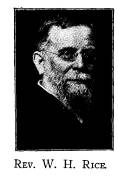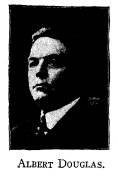Ohio History Journal
|
EDITORIALANA. |
|
|
|
NEW TRUSTEES OF THE SOCIETY.
REV. WILLIAM HENRY RICE, D. D. Among the historic characters who played a thrilling and imperish- able part in the early annals of Ohio were the three Moravian mission- |
|
|
|
son of this marriage was James Alexander Rice, who married Josephine Charlotte Leibert, descendant of a Moravian family. William Henry Rice, the son of this union was born at Bethlehem (Pa.), September 8, 1840, during the Harrison campaign, whence his name, as we learn from the history of Tuscarawas county by Byron Williams. From the same source we condense the facts concerning the life of Mr. Rice. Mr. Rice enjoyed the home and school training of Bethlehem, that famous center of Moravian learning, until he was received into Yale College before his fifteenth birthday as a member of the Class of 1859, when he was graduated as one of the "scholars of the House", standing number seven in a class of one hundred and ten students, although he was the youngest but one of the class. On graduation he became a mem- ber of the Phi Beta Kappa fraternity. The next two years were spent in teaching in the public and select schools of New Haven, Conn., after which he entered Yale Theological Seminary. In his middle year he joined the Union Army and was elected Chaplain of the One Hundred and Twenty-Ninth Pennsylvania Infantry. He took part in the battles of Fredericksburg and Chancellorsville. (350) |
Editorialana. 351
He re-enlisted as a private in the
Thirty-Fourth Pennsylvania, an
emergency regiment that served in the
Gettysburg campaign. After being
honorably discharged he completed his
theological course at Yale and
was appointed to the pastoral charge of
a German Moravian Home Mis-
sion Church in New Haven. He then served
by successive appointments
through the following forty odd years
from 1867 to 1907 in the Moravian
pastorates of York, Nazareth and
Philadelphia, Pennsylvania; in Brook-
lyn, New York City and on Staten Island,
New York; and for the past
ten years at Gnadenhutten, Ohio. He is
the Dean of the American
Moravian Pastors, having seen more years
of service than any other
minister on the active list. He also
served as the assistant Chaplain in
St. Luke's Hospital in New York. In 1869
and again in 1899, he was
sent to the General Synod of the
Moravian Church which meets once
every ten years in Hernhut, Saxony,
having been elected both times by
the American Moravian Synod. In Ohio he
is the Moravian Vice Presi-
dent of the State Christian Endeavor
Union. He is a Vice President of
the Moravian Historical Society of
Pennsylvania, and a life member in
the Pennsylvania Historical Society. He
is the author of "David Zeis-
berger and His Brown Brethren," a
most graphic and accurate account
of the religious labors of Zeisberger
among the Delaware Indians
of Eastern Ohio. The historical address
delivered by Mr. Rice at
the Gnadenhutten Centennial, in 1898,
was published in a previous
volume of the Ohio State Archaeological
and Historical Society annuals.
During his Gnadenhutten pastorate he had
a large part in the erection
and dedication, free of debt, of the
beautiful memorial sanctuary, the
John Heckewelder Memorial Moravian
Church. On July 27, 1905, the
Board of Trustees of Scio College
conferred upon him the honorary
degree of Doctor of Divinity. On June 13, 1907, in the
Encampment of
the Grand Army of the Republic at Canton
for the Department of Ohio,
Dr. Rice was elected Chaplain for the
Department. He has successively
been a Comrade of the Grand Army of the
Republic in Rankin Post No.
10, Brooklyn, New York; in Anna M. Ross
Post, Philadelphia, and J. K.
Taylor Post, Bethlehem, Pennsylvania;
and lastly of Alexander Rank
Post No. 534, Gnadenhutten, Ohio, where
he is serving his fifth term as
Post Commander. During his pastorate at
York, Pennsylvania, he was
married to Miss Mary Elizabeth Holland,
eldest daughter of Rev. Francis
R. and Augusta Wolle Holland, of Hope,
Bartholomew County, Indiana.
They have two children, Doctor James
Francis Rice, of Buffalo, New
York, and Rebekah Holland Rice, of
Gnadenhutten. Mrs. Rice is a de-
scendant, on her mother's side, of the
Benezet family of Philadelphia,
Huguenot exiles from France. Mr. Rice is
an accomplished theological
scholar and linguist, an earnest and
eloquent speaker and unites a ripe
maturity of experience and wisdom with
the enthusiasm of vigorous
youth. He will enter con amore into
the work of the Society of which
he now becomes a Trustee.
|
352 Ohio Arch. and Hist. Society Publications.
ALBERT DOUGLAS. The county of Ross is one of the richest in Ohio in historic lore. It figured potently in the pioneer and early state annals. Chillicothe was |
|
|
|
attorney in 1876. His success was all the more marked as the county at that time was largely Democratic. He was re-elected in 1878. He held no other political office until he was placed upon the State Republican ticket in 1896, as one of the presidential electors-at-large. When the Electoral College met he was made chairman of that body. Two years ago (1906) he was the choice of the Republicans of his district for repre- sentative in the Sixtieth Congress. He was elected by a handsome ma- jority. In 1905 Mr. Douglas received the honorary degree of LL. D. from the Ohio University and the same degree from Kenyon College in 1906. In 1880 he married Lucia C. Taylor of Brooklyn, N. Y. Mr. Douglas is a man of scholarly tastes and a most polished and forceful speaker. His ability in this line places him in the front rank of the political orators of the state. He is constantly called upon to deliver addresses before colleges and literary societies. At the annual meeting of the Society, held March 22, 1907, Mr. Douglas delivered the address, his subject being "Arthur St. Clair." It was later published in the annuals of this Quarterly.
ETHICAL FUNCTION OF THE HISTORIAN. The International Congress of Historical Sciences, whose annual session attracted scientists from all parts of the world, was held this year (from August 6 to 12) in the great Philharmonic Hall at Berlin, Germany. The governing body selected Dr. David Jayne Hill, Ambassador |

